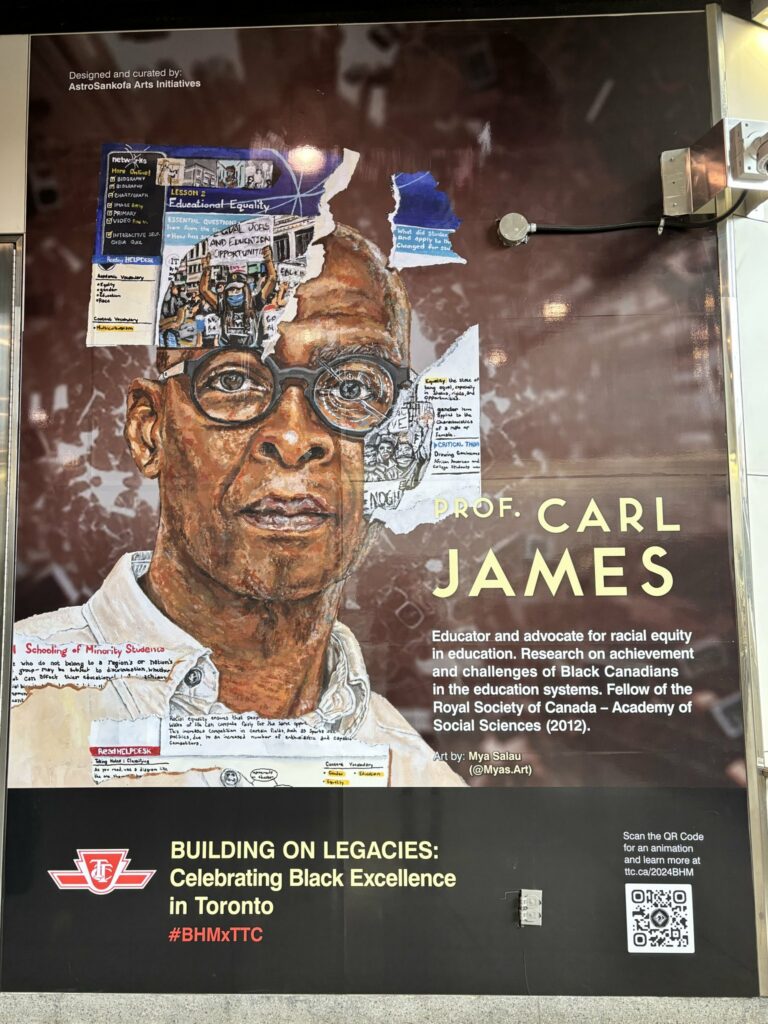
The Toronto Transit Commission’s (TTC’s) subway system recently became the canvas for a new mural honouring York University Distinguished Research Professor Carl James and his impact on community and racial equity.
The mural – which features an evocative portrait of James – can be viewed at the York University TTC subway station, as well as a bus wrap that’s emblazoned on a TTC vehicle deployed from the Queensway Garage, and at various subway stops across the city. It pays tribute to Professor James’ impactful contributions to education, community and racial equity.
Mya Salau, a third-year student at the University of Toronto Scarborough, was commissioned for the project by AstroSankofa Arts Initiatives, a Canadian organization that describes itself as committed to supporting Black and Indigenous emerging artists in public art and Web3 activities.
Salau’s inspiration for the mural stemmed from her desire to capture the essence of James’ teachings and accomplishments. To create the image, she used acrylic paint on canvas, then had the painting digitized to be displayed on TTC buses and murals. She also incorporated various visual elements to reflect his dedication to educational equality, youth studies, and race and ethnic relations.
“I wanted the artwork to not only celebrate Professor James, but also to serve as a reminder of his profound impact on our community,” Salau explained. “Through this mural, I hope to convey the essence of his teachings and inspire others to continue his legacy of advocacy and social change.”
The mural features a captivating portrait of Professor James adorned with textbook pages, symbolizing knowledge, literature and the power of education. “I also added a futuristic eye lens,” Salau said, “as a lot of his work advocates for future change and improving systems in Canadian society.”
The mural – which features an evocative portrait of James – can be viewed at the York University TTC subway station, as well as a bus wrap that’s emblazoned on a TTC vehicle deployed from the Queensway Garage, and at various subway stops across the city. It pays tribute to Professor James’ impactful contributions to education, community and racial equity.
Mya Salau, a third-year student at the University of Toronto Scarborough, was commissioned for the project by AstroSankofa Arts Initiatives, a Canadian organization that describes itself as committed to supporting Black and Indigenous emerging artists in public art and Web3 activities.
Salau’s inspiration for the mural stemmed from her desire to capture the essence of James’ teachings and accomplishments. To create the image, she used acrylic paint on canvas, then had the painting digitized to be displayed on TTC buses and murals. She also incorporated various visual elements to reflect his dedication to educational equality, youth studies, and race and ethnic relations.
“I wanted the artwork to not only celebrate Professor James, but also to serve as a reminder of his profound impact on our community,” Salau explained. “Through this mural, I hope to convey the essence of his teachings and inspire others to continue his legacy of advocacy and social change.”
The mural features a captivating portrait of Professor James adorned with textbook pages, symbolizing knowledge, literature and the power of education. “I also added a futuristic eye lens,” Salau said, “as a lot of his work advocates for future change and improving systems in Canadian society.”
James worked closely with Salau as she shaped the mural over various iterations. “I very much appreciate that Mya was able to share an early version of the painting, and use my comments to develop the final version,” he says. “Her efforts to represent me and my scholarship in the painting reflects her reading of my work.”

That work, in a nutshell, is about addressing systemic inequalities in Canadian education and society.
From his early days as a community organizer to his current role as the Jean Augustine Chair in Education, Community and Diaspora at York University, James has provided research on race, education and immigration that sheds light on the challenges faced by Black students in the Greater Toronto Area. His investigations have catalyzed significant policy changes, including the end of academic and applied streaming for Grade 9 students in Ontario.
“It is not about research for research’s sake, but to inform action,” James said in a recently published interview.
“Community is often a central feature for those who have been marginalized, and it is through collaboration and advocacy that we can bring about meaningful change.”
That work, in a nutshell, is about addressing systemic inequalities in Canadian education and society.
From his early days as a community organizer to his current role as the Jean Augustine Chair in Education, Community and Diaspora at York University, James has provided research on race, education and immigration that sheds light on the challenges faced by Black students in the Greater Toronto Area. His investigations have catalyzed significant policy changes, including the end of academic and applied streaming for Grade 9 students in Ontario.
“It is not about research for research’s sake, but to inform action,” James said in a recently published interview.
“Community is often a central feature for those who have been marginalized, and it is through collaboration and advocacy that we can bring about meaningful change.”
The unveiling of the mural on Feb. 24 coincided with Black History Month, a time to celebrate the rich contributions of Black Canadians to society. Alongside other honourees, James was recognized during a TTC subway tour honouring Black Torontonians, showcasing their enduring legacies and contributions to the city.
Article originally published in the April 2, 2024 issue of Yfile

